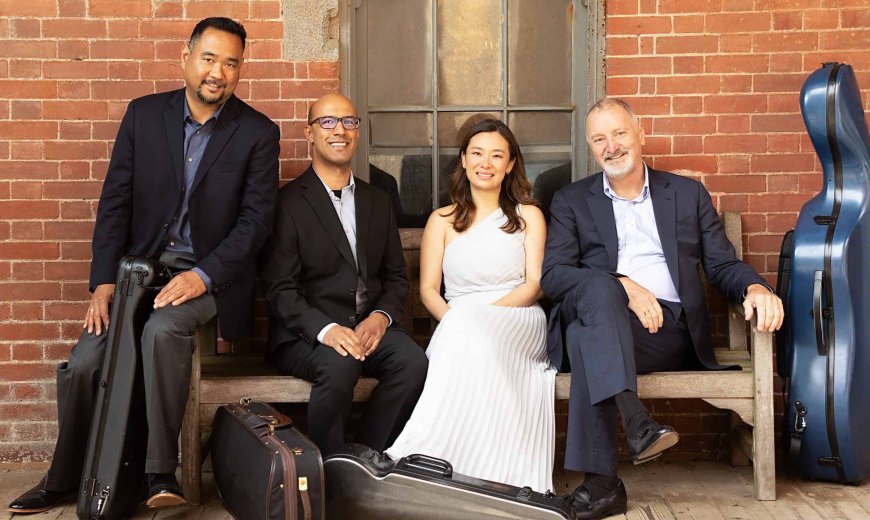
After four decades, a beloved San Francisco ensemble will soon play its last notes together.
The Alexander String Quartet plans to bid farewell to the Bay Area with a concert at Kohl Mansion in Burlingame on May 4 before heading to the East Coast the next month for the group’s final performances.
Formed in 1981 in New York City, the ensemble was the first American quartet, in 1985, to win the Portsmouth (now Wigmore Hall) International String Quartet Competition. The group moved to San Francisco in 1989, where it became a stalwart of the local chamber music scene.
“They’ve meant a great deal not just to the area but also to the chamber music world at large,” said Music at Kohl Mansion Executive Director Patricia Kristof Moy. “We were able to count on them so far above and beyond the call of duty. … It truly is a family feeling with the Alexanders.”
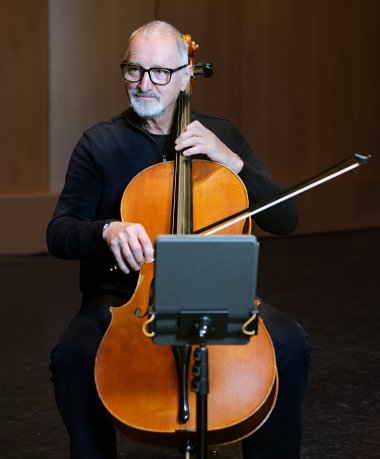
Only one of the Quartet’s original members — cellist Sandy Wilson — currently remains. The group’s outgoing lineup also includes first violinist Zakarias Grafilo (joined 2002), second violinist Yuna Lee (joined 2023), and violist David Samuel (joined 2021). Last April, the ensemble announced it would be disbanding at the end of the 2024–2025 season, and now, for the first time, the members have spoken at length about the factors that led to their decision.
It “was not ever our intention that this would be the disbanding of the Quartet,” Wilson told SF Classical Voice by phone from his San Francisco home.
He and Paul Yarbrough, the group’s founding violist, who retired in 2021, had agreed not to step down at the same time. Wilson, now 70, said that for several years, he had made clear to his younger colleagues his plans to retire at his current age, so the decision to disband was left up to Grafilo, Lee, and Samuel. The three ultimately determined that the challenges of sustaining the Quartet — chief among them searching for a new cellist, who would have likely had to relocate (perhaps with a household) to pricey Northern California — were too much to handle.
Academic institutions’ declining appetite for supporting musical ensembles also played a role.
After all, the Quartet had moved to the Bay Area in 1989 to be San Francisco State University’s ensemble-in-residence through a “town and gown” partnership between the school, the Morrison Chamber Music Foundation, and San Francisco Performances. In fact, Grafilo initially met the Alexanders while an SFSU student in the mid-1990s and credits Yarbrough, then one of his chamber coaches, for encouraging him to become a full-time musician.
The residency had been diminished in recent years, Wilson said, and as a result the Quartet needed to rely more on touring to sustain business. But that didn’t prove easy, either.
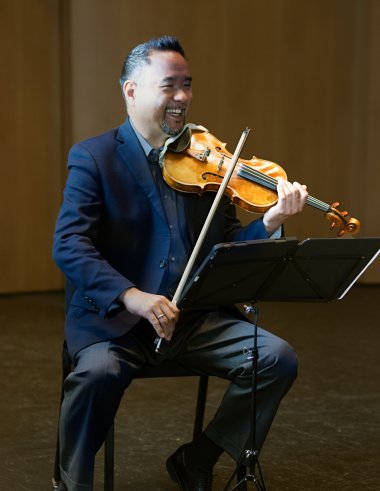
Since the pandemic, “presenting organizations have cut back on the number of concerts they’ve been able to offer, so that makes it sort of difficult for groups to continue to tour,” said Grafilo, who lives in Daly City. “It’s not surprising, but for us … it seemed like a good time to hang things up on our own terms.”
But that hardly means going it alone. The ensemble, which has recorded all of the Beethoven, Brahms, Béla Bartók, and Zoltán Kodály quartets, has also been known for its collaborative projects — including a 2023 album that featured classical guitarist William Kanengiser and paid tribute to Sting, the Beatles, and Led Zeppelin.
Sharing musical knowledge has been a part of the Quartet’s DNA since its earliest days. From the start, the founding members saw a market for ensemble musicians who were willing to spend time teaching in classrooms. Wilson estimated that in the Quartet’s first five years of existence, he played more than 100 school concerts, mostly in Connecticut, for audiences ranging from kindergarten through high school. That later grew into regular visits for the group to Baruch College and St. Lawrence University in New York as well as Pennsylvania’s Allegheny College.
“It became a way for us to be very busy and engaged and productive,” Wilson said. “We were doing something to seed at least a modicum of knowledge and even affection for chamber music in people who are much younger than the typical demographic who would listen to us.”
Educational outreach continued to be an essential component of the Quartet’s service to the Bay Area. For many years, the ensemble partnered with music historian Robert Greenberg for Saturday morning concerts presented by SF Performances. And Moy said that the Alexanders were the first group to regularly work with Music at Kohl to visit middle and high schools across the Peninsula, giving performances at school-wide assemblies, leading seminars that were tailored to supplement classroom curriculum, and coaching student orchestras.
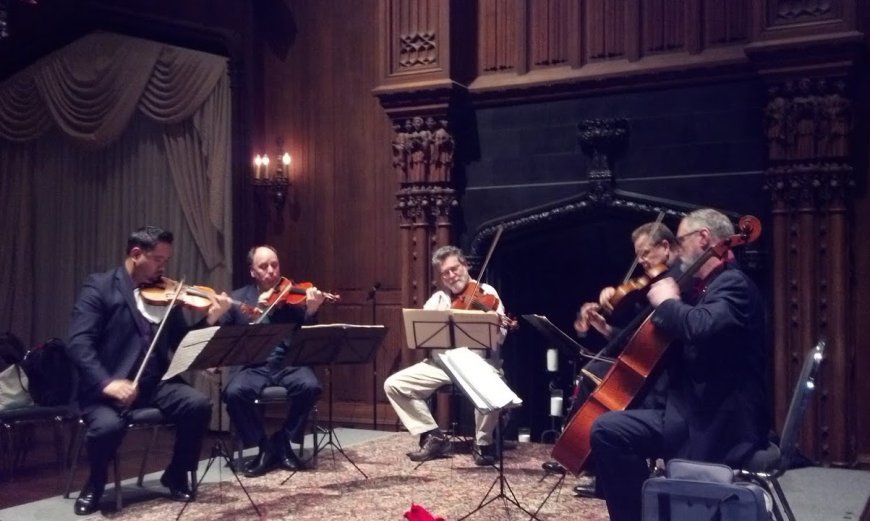
In the spirit of expanding horizons, it’s only fitting that the Quartet’s final Bay Area concert is set to feature a work by the young Iranian American composer Kian Ravaei, whom the ensemble met at a festival a few summers ago and whose piece The Little Things the group has performed multiple times since 2023. (An album featuring Ravaei’s piece, which was loosely inspired by the poetry of Emily Dickinson, is in the works.)
Also on the program is Haydn’s String Quartet in G Major, Op. 77, No. 1 — one of the composer’s late, lesser-known quartets — and Brahms’s Piano Quintet in F Minor, Op. 34, for which the Alexanders are slated to be joined by Bay Area concert pianist Jeffrey LaDeur, a longtime friend of the group.
“We did some very good work, we’ve made some wonderful connections,” Wilson said. “We have probably left something of a legacy, particularly here in the Bay Area, and we’re certainly very proud of that.”
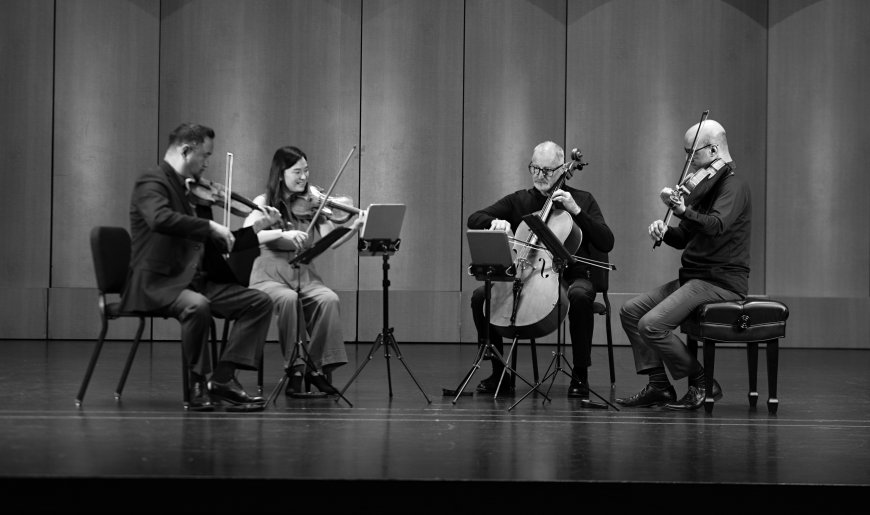
The Bay Area has in recent years lost two other staple chamber ensembles, including the St. Lawrence String Quartet, which spent more than two decades as Stanford University’s quartet-in-residence and disbanded last year. The Telegraph Quartet, which was previously the San Francisco Conservatory of Music’s quartet-in-residence and in its early years mentored by the Alexanders, moved to Ann Arbor last fall to take up a post at the University of Michigan.
“There is life after string quartet, I’ve heard,” Wilson said, noting he’s particularly looking forward to diving into the solo cello repertoire and flying without carrying a cello on his back, “so we’ll find out.”
This story was first published in Datebook in partnership with the San Francisco Chronicle.




